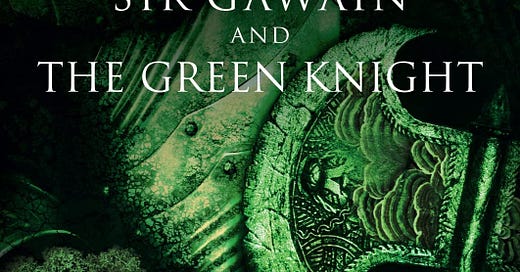If you are looking for the beginning of the study for Sir Gawain and the Green Knight then you can go HERE for a brief introduction. At the bottom of the introduction you will find the links to each section of the study guide as it becomes available. If you would like to see the growing list of book studies available for free on this site you can go HERE. Enjoy!
Virtues/Vices/Great Ideas: (Find them in the Text)
Happiness, Religion, Beauty, Hospitality, Tradition
Grammar Questions: (The Information of the Text)
What kinds of events did the poet describe in the first stanza?
What did the poet say he would tell us about if we “will listen to this lay”?
What time of year is it as the story begins and what is going on?
What were the “nobles” doing after “Noel” had been “announced anew”?
It “pleased him [Arthur] not to eat” at the feast until what had happened first?
What is Gawain’s relationship to Arthur?
Who interrupted the feast just as the first course was being served? Describe his appearance.
What distinctive and unusual quality did both the horse and rider share?
What did everyone who saw the man think no would “have the might” to do?
Whom did the mysterious knight say he came to seek out?
Logic Questions: (Interpreting, Comparing/Contrasting, Reasoning)
What do Aeneas, Romulus, Tirius, Langaberde, and Felix Brutus all seem to have in common with one another?
Why might it be important to the story that it begins as “Christmas-tide”? How might this set the tone of the story?
Of Arthur it is said, “so loved he the less either long to be lying or long to be seated”, what does the poet mean to tell the reader by this?
Why did the poet say, upon the entry of the “fay-man”, that his coming was “so that their lord might have leave at last to take food”?
The fay-man was carrying in one hand “a holly-bundle’ and “an axe in the other, ugly and monstrous”. What might be symbolized by these two items?
Rhetoric Questions: (The Analysis of Ideas in the Text)
What value is there in telling a story by means of poetry as opposed to by means of prose writing? What might be something that is gained by this approach? What might be lost?
In this story we see an example of extravagant celebration during the Christmas season. Do you think Christmas should be celebrated in this manner, with fancy and beautiful decorations, the exchanging of gifts, etc.? Why or why not?
Theological Analysis: (Sola Scriptura)
Read Matthew 2:1-12. How might this passage suggest a tradition of gift-giving at Christmastime?



